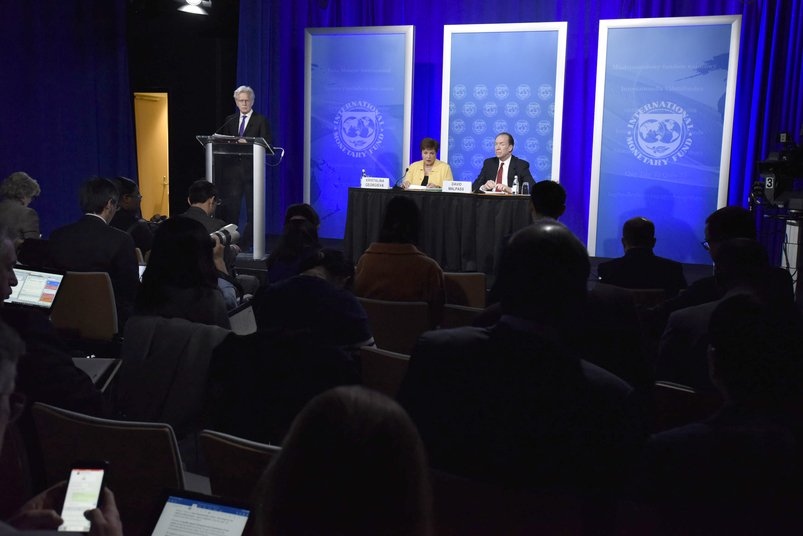The coronavirus has now been characterised as a pandemic, having surpassed 120,000 confirmed cases and reaching 114 countries worldwide. The international donor community needs a coordinated response not only to contain and mitigate the pandemic, but also to gear up for a potential global economic crisis.
A global response for a global-scale health crisis
In early February, the World Health Organization (WHO) called for international support for a $675 million global preparedness and response plan to contain the outbreak and support vulnerable countries until April 2020. With the coronavirus now being classified as a pandemic, the required financial resources to mitigate the virus transmission are enormous. The international donor community has responded to this call – the UN released $15 million to the WHO and UNICEF, the World Bank has announced a $12 billion response package, and the International Monetary Fund (IMF) activated a $50 billion rapid disbursing financing facility.
But more than just a lumpsum of funding is required; there is also a glaring need to prioritise immediate disbursements to countries with weak healthcare systems. The WHO reported that Iran, the country with third highest number of confirmed coronavirus cases, has a shortage of medical supplies and significant demand for frontline health workers. Egypt and Algeria, countries with the highest number of confirmed coronavirus cases in Africa at 59 and 20 respectively, have less than two hospital beds per 1,000 people. Nigeria, the most populous African country with two confirmed coronavirus cases, has less than one (0.4) physician per 1,000 people.
International organisations should act swiftly to support low-income countries to detect, treat, contain and mitigate the transmission of the coronavirus. Especially given many of the traditional donors from advanced economies are also dealing with the coronavirus outbreak in their own jurisdictions.Global cooperation on targeted sectoral assistance
From falling flight sales to oil prices, evidence on the economic impact of the outbreak is becoming more evident. A loss of $50 billion in export revenues across global value chains is estimated, largely in precision instruments, machinery, automotive and communication equipment. A loss in flight sales is also anticipated to reach $30 billion, and airlines in Israel, Italy and Finland recently announced plans to lay-off thousands of employees. Without textile supplies from China, the garment sector in Cambodia is at risk of idling up to 160,000 workers. And with falling oil prices, sub-Saharan Africa is estimated to lose up to $30 billion worth of export revenues.
Global uncertainties around the escalation of the coronavirus have tightened cross-border lending conditions, and US government bond yields are at record low. With less access to international capital, both multilateral and regional banks have a critical role to play in supporting firms experiencing cash flow difficulties to prevent them from going bankrupt.
The $6 billion of International Finance Corporation (IFC) funding to support private sector operations in particular will keep companies afloat and jobs intact until the pandemic subsides. But the IFC’s financial assistance would be more strategic if it is directed to firms that are most connected to global value chains and have a significant number of employees across the world. As part of increasing private sector resilience against vulnerability to future shocks, IFC funding can help countries to start diversifying industries, trading partners and suppliers.
Gearing up for a potential economic and financial crisis
The negative economic impact of the pandemic is likely to be amplified by financial linkages. Global financial safety nets such as the IMF should gear up for a potential economic crisis among the most vulnerable countries and to curtail financial risks that are potentially building up in important financial institutions worldwide.
To illustrate, a slump in global economic activity since the outbreak has manifested in a 30% decline in oil prices earlier this week. Oil exporters (e.g. Angola, Nigeria, and Mongolia) will see a significant loss in export receipts and a fall in their respective government’s oil-related tax revenues. This will trigger a depreciation of the local currency, which will make government debt servicing more difficult, increase costs of imported goods and services, and potentially speed up inflation.
These conditions will signal an unstable economy, discouraging foreign investment. Without countervailing policy measures and a protracted pandemic, oil-dependent countries will likely face an economic crisis. International organisations need to closely monitor individual countries’ structural constraints and macro-financial linkages to help prevent them from falling into a full-blown economic crisis.
The IMF’s lending facilities could help low-income countries to mitigate the coronavirus. But beefing up the organisation’s underfunded Catastrophe Containment and Relief Trust (CCRT) – which grants debt relief for public health disasters – may also be equally valuable. Today, the UK announced that it will extend $192 million to the CCRT.
Globally, there are many risks international organisations need to look out for. The coronavirus is spreading in all G7 countries, and the global economic outlook will be dampened by the compounded fallout from China and other high-income economies such as Italy, which is currently on lockdown. Together with central banks, international organisations – such as the IMF – should also look at the potential financial stability risks building up around the insurance sector and corporate debt.
The insurance industry might start to feel a burden with claims for coronavirus-related medical expenses and business disruption losses, while the corporate sector may struggle to make debt repayments amidst profit losses and weak global economic prospects. If insurance and corporate firms’ burdens go out of proportion and they are globally connected to important financial institutions (such as domestic and foreign banks), this can trigger a global financial crisis.
As individual countries’ hands are tied in dealing with the increasing economic fallout and loss of lives in their own jurisdictions, international donors and organisations need to level up efforts in directing aid to the most vulnerable and in protecting the world from falling into an economic recession.

